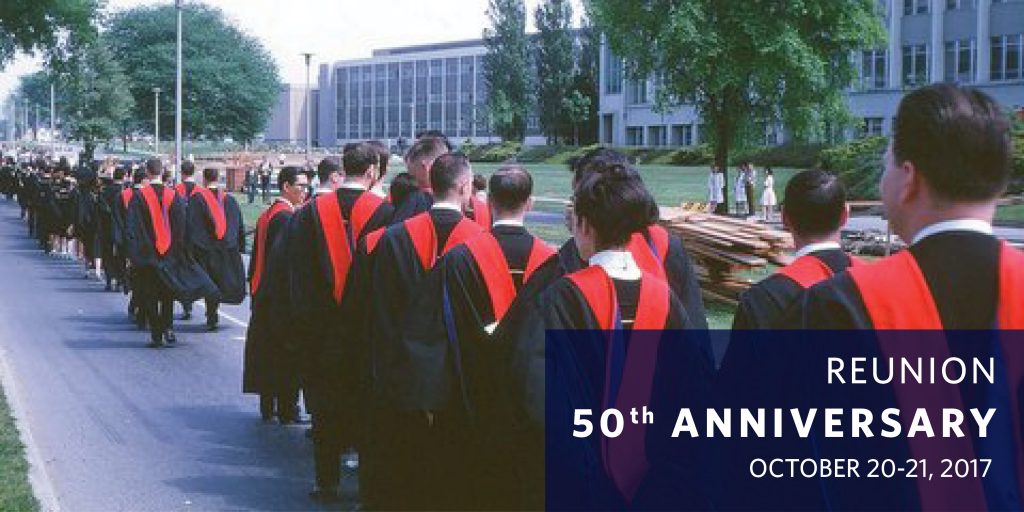INTERESTED IN ATTENDING?
If you graduated from the MD Class of 1967, you’re invited to attend your 50th Anniversary Reunion on October 20-21, 2017.
For those interested in attending, the reunion planning committee requests that you show your interest by completing the form by clicking
I’M INTERESTED IN ATTENDING.
REGISTER
A registration link/form will be emailed or mailed in August.
PROGRAM (to be confirmed in August)
MD Class of 1967 Welcome Reception
DATE: Friday, October 20
TIME: 6:00 PM – 9:oo PM (TBC)
LOCATION: Robert H. Lee Alumni Centre – Wong Trainor Welcome Centre – 6163 University Boulevard
WHAT: Catch up with your classmates over wine and appetizers at the new Robert H. Lee Alumni Centre on campus at UBC.
TED Talks & Campus Tour
DATE: Saturday, October 21
TIME: 1:00 PM – 5:00 PM (TBC)
LOCATION: Life Sciences Centre – 2350 Health Sciences Mall
WHAT: Listen to classmates share their experiences in a “TED Talks” style event followed by a tour of the Life Sciences Centre and optional visits to the Beatty Biodiversity Museum, Museum of Anthropology and Botanical Gardens.
Gala Dinner – Celebrating 50 Years
DATE: Saturday, October 21
TIME: 6:00 PM arrival, 7:00 PM dinner (TBC)
LOCATION: University Golf Club – 5185 University Blvd (TBC)
WHAT: Celebrate 50 years since graduation at our farewell gala dinner. Please note: depending on interest for this event, the location may change.
ACCOMMODATION
We encourage you to book your accommodation as soon as possible as Vancouver Writers Fest is taking place October 16-22 and accommodation around Granville Island/Kitsilano is expected to be busier than normal. We suggest the following two hotels for your stay:
Westcoast Suites (UBC)
Looking to be close to the action? Reserve your room at the Westcoast Suites (5961 Student Union Blvd) on campus and stay close to all of the reunion activities taking place at UBC. Westcoast Suites features convenient, modern, one-bedroom hotel suites with wood and stone accents, luxury linens, wifi, fully equipped kitchens, a beautiful natural backdrop and more.
King bed + Sofa bed || From $185 + tax per night
Reservations: Book online at http://suitesatubc.com/accommodations/west-coast-suites/ or 1-888-395-2540.
Metropolitan Hotel (Downtown Vancouver)
For those wanting to stay more central to Vancouver, we have secured a room block available on a first come, first serve basis at the Metropolitan Hotel (645 Howe St). Reserve your room today to guarantee your stay. Unreserved rooms will be released September 20. Room includes internet (wifi), access to the Business Centre and Health Club.
Luxury King Room || $209.00 + fee + tax per night
Reservations: Contact the Reservations Department by calling 604-987-1122 or toll free 1-800-667-2300 or by emailing reservations@van.metropolitan.com and quote the Group Number “293271” or online at http://tiny.cc/metvan_MD67.
Valet and self-parking services are offered at the Metropolitan Hotel. Overnight parking is $40.00 per night, per vehicle; evening parking (6:00 PM – 12:00 AM) is $12.00 per evening, per vehicle; and day parking is $9.00 per hour, to a maximum of $45.00. |

